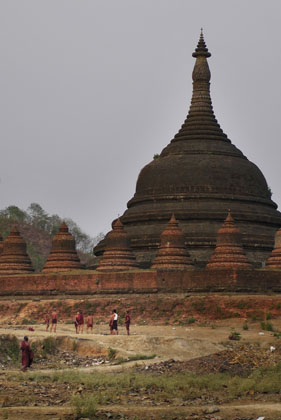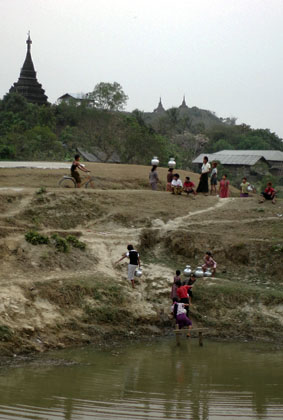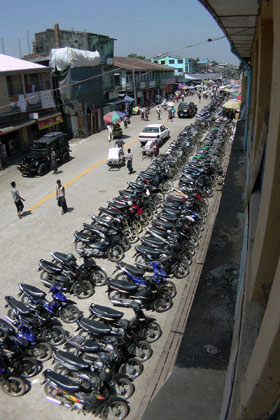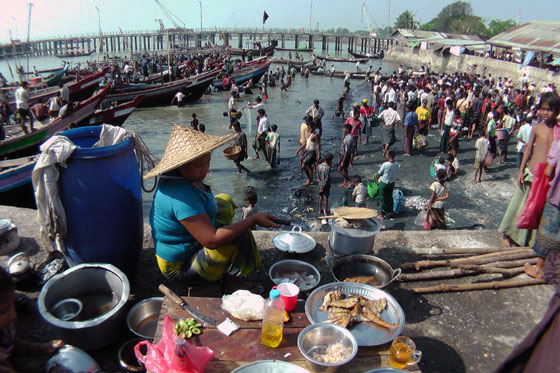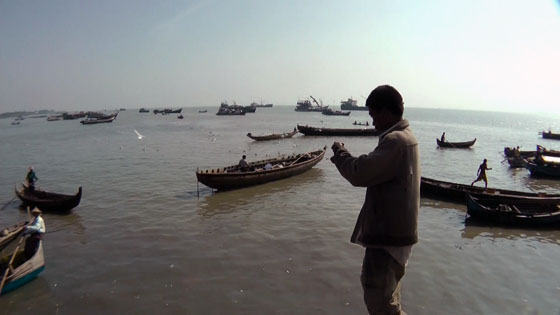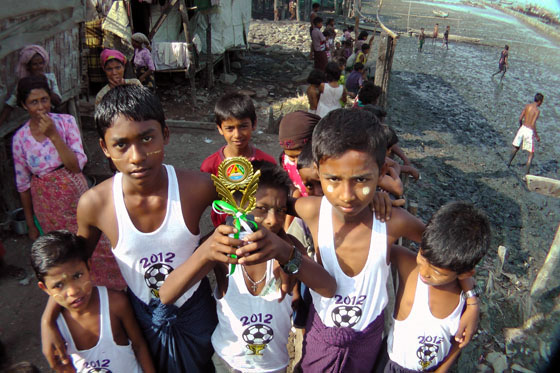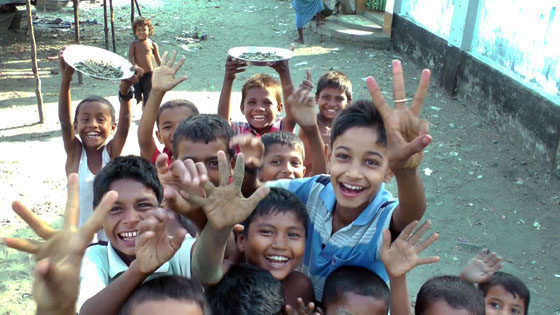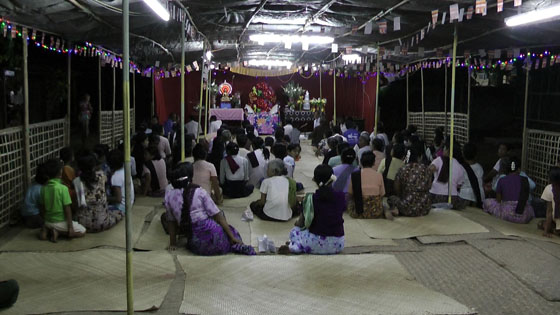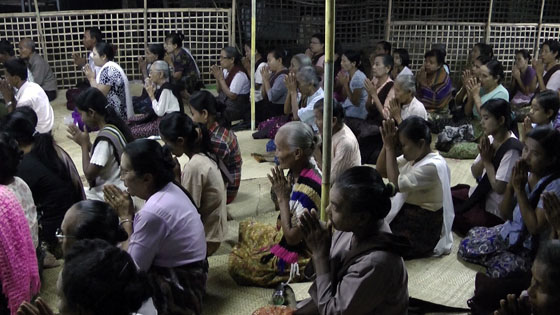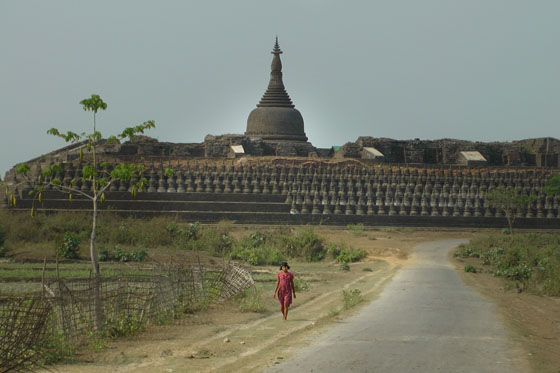 |
||
|
|
|
|
เมี่ยวอู (Mrauk U) เมืองหลวงเก่ายะไข่ ต้องนั่งเรือโดยสารเข้าไป 6 ชั่วโมงจากซิตตุ่ย เมี่ยวอูเป็นเมืองที่ผู้เขียนชอบที่สุดในพม่า เพราะที่นี่ชาวบ้านยังคงอยู่อาศัย ทำไร่ทำสวน รวมไปถึงอาบน้ำ และตักน้ำจากบ่อบาดาล ที่อยู่ข้างๆโบราณสถานอายุหลายร้อยปี (ในรูปข้างบนเณรกำลังเตะตะกร้อ) ซึ่งนี่ทำให้โบราณสถานเหล่านี้ดูมีชีวิตชีวาอย่างยิ่ง ต่างจากซากหินกระด้างของพุกามมากมาย แต่ด้วยเหตุนี้แหละที่เมี่ยวอูถูกขึ้นบัญชีดำ ในฐานะแหล่งโบราณสถานเสื่อมโทรมโดย UNESCO สำหรับผู้เขียน ขอบอกว่า อย่าได้แคร์ บันทึก : คำว่า ยะไข่ ไทยเรียกเพี้ยนมาจากคำว่า ระไคน์ (Rakhine) ซึ่งมาจากคำว่า ระไคน์-ปยู อีกที คำนี้เป็นคำที่คนอินเดียใช้เรียกผู้คน ที่อยู่ทางตะวันออกของอินเดีย แปลว่า พวกคนเถื่อน ต่อมานักวิชาการตะวันตกได้เอาคำนี้มาแยกออก เรียกชนชาติที่มีอาณาจักรเก่าแก่เกือบสองพันปี ทางตะวันตกเฉียงเหนือของพม่าว่า ระไคน์ (แต่คนเหล่านี้เรียกตัวเองว่า อาระกัน) และชนชาติที่มีอาณาจักรในยุคเดียวกันทางตอนกลางของพม่าว่า ปยู ซึ่งบัดนี้เป็นชนชาติที่สาบสูญไปแล้ว ทั้งสองกลุ่มชนนี้เป็นผู้ตั้งถิ่นฐานแรกๆในภูมิภาคเอเชียตะวันออกเฉียงใต้ ก่อนมอญและขอมโบราณ บันทึก : ปธน.พม่าประกาศภาวะฉุกเฉินรัฐยะไข่ ระดมกำลังเข้าคุมพื้นที่ , 11 มิถุนายน 2555 ภาพข้างล่างนี้เป็นภาพเมืองซิตตุ่ย (Sittwe) เมืองหลวงรัฐยะไข่ เมื่อสองเดือนก่อนที่ผู้เขียนได้ไปเยือน และเป็นที่เกิดเหตุการปะทะกันระหว่างชาวพุทธและชาวมุสลิมในปัจจุบัน
|
||
It's a weird thing, the world we live in now, where everyone has a cameraphone. There's a line in the film ["Holy Motors" ]: 'Cameras used to be bigger than us and now we can't even see them.' When I started, there was something almost romantic about the notion of paparazzi. I mean, it wasn't. They were still chasing you down the road. But that guy had to put film in his camera and work out whether it was worth pressing the button to take the shot, otherwise he's got to stop and change the film. So it was like this age of innocence. Whereas now, the cameras are everywhere. So if I'm at home in sweatpants, looking like a total dag, and I step outside? You don't even know where the cameras are any more. The first serious film I ever saw was a double bill of Nanook of the North and L'Age d'or. If you think of cinema, everything comes between the basic documentary Nanook and L'Age d'or - still the wildest film ever made. Everything else is in the middle. Kiarostami once claimed that you should never uproot a fruit tree. Transfer it to foreign soil and it probably won't bear fruit. Or, if it does, "the fruit will not be as good as in the original place". The director smiles. "Yes, but now something's different. I'm like the tree that's in my garden back home in Tehran. When I leave my home, there is no one to water it for weeks on end. But the roots are so deep, they don't need to be watered. I'm the same way. Leaving Iran would be very worrying for a younger artist. But I'm not making films about now. I'm making films about older times, bringing them up from deep in the ground."... บันทึก : เพิ่งอ่านเจอว่า มีคนอธิบายพฤติกรรมการไม่เข้าคิวของคนจีนในประเทศจีนว่า เป็นเพราะในสมัยคอมมิวนิสต์ ประชาชนจีนจะได้รับการปันส่วนอาหารเท่าๆกัน โดยการแจกคูปองแล้วไปรับอาหาร ซึ่งถ้าใครมาก่อนก็ได้ก่อน ใครมาหลังก็อาจจะอดหมดก่อนได้ ผลก็คือคนจีนปัจจุบันก็ยังคงติดนิสัยมาก่อนได้ก่อนอยู่เหมือนเดิม ซึ่งก็สอดคล้องกับระบบทุนนิยมแบบเห็นแก่ได้ในปัจจุบัน You have to know that each [book] adaptation will be different. What you've done before will not help you on the next one. I've said before you have to betray the book in order to be faithful to the book. You have to recognize that literature is not cinema: they both do different things well, and there are certain things they cannot do that they other one can. I'm pretty ruthless about discarding things from a book that will not work cinematically. People asked me today how can you have the [nerve] to do something like that, and I said, I know that if I like it, there will be some other people who like it. In the time of the Greeks, Seneca said, the better a piece of art, the more rejection it will receive in its moment — that's a social law. I don't know why people are so worried, like some of my distributors. I tell them don't worry, who cares? This is positive; you should be honored. I hope that each new film shows a new side of me. The audience responds to this film ['Amour' ] differently because we know this is something we've confronted in our lives or something we know is going to confront us. It's really about the theme. I don't think I'm growing wiser or quieter with age. "On the Road" was a story of men and women in their youth. It was a time when they had no idea of what they would become. I've seen encounters between Koreans and foreigners many times and it has struck me always as superficial. Whether because of time limit or because of shyness, people will smile and say nice things, but really, they don't exchange a lot. I don't know why. I wanted to dig into this kind of encounter until I got something out of it. I'm sure that we can never be the witness of a story from its beginning to its end. I would say that this film ["Like Someone in Love" ] doesn’t have an adequate opening and it doesn’t have a real ending either, but it also proves my idea that all films start before we get into them and they end after we leave them. People don't know how to take it. The kind of movies I do can be interpreted in a lot of ways, and someone can rightly hate it for good reasons that they can articulate, and then somebody else can say, 'Yes, I experienced all those things and that is why I liked it.' You really hope that people will get them right off the bat because most people aren't ever going to see it again. Lazily titled after Chaplin's 1940 Hitler-Mussolini satire The Great Dictator, Sacha Baron Cohen's new film The Dictator is part of our current political slackness where propaganda is confused with news, parody is confused with satire, principle is confused with bias and mob-mentality is confused with democracy... Since, as Michael Fink acknowledged, the CGI dinosaurs [ in Terence Malick's "The Tree of Life" ] are painstakingly created from 0s and 1s and therefore has to be meticulously planned in every detail, what was the intent of the pivotal scene in which the one dinosaur stomped on, and then seemed to caress/stroke, a smaller dino who was lying in a riverbed? "It is disgusting to play with such a thing," fumed Cannes festival director Thierry Frémaux in the wake of [ the lineup ] leak. "There is a code of conduct for Cannes and it must be respected. Those who don't respect the code will never come back to Cannes."... I just think Sacha Baron Cohen could be a far more effective comedian if he did do more humour about his Jewishness, his Israeli heritage and the often conflicting relationships between Jews and Arabs. Legend says (and an eyewitness confirms) that at the 1974 New York Film Festival press screening of Celine and Julie Go Boating, Pauline Kael walked out in the middle announcing, "I'm going to the movies!" A lot of actors get in touch with us and say: 'Someone took me to their house and made me watch The Puffy Chair. I don't quite know what you're doing but I want to do it and I will sleep on your couch if necessary' I don't like interactivity when it comes to doing films. That's being a storyteller. A movie to me is something I make, and you can watch it. Hopefully I engage you, and you like it and are stimulated by it. But you don't get to share in it. But in video games, you can, and that's interesting. The two worlds should both exist. [ Marvel's The Avengers ] proves the brainwashing that has happened to pop audiences in the generations since comic books and TV stole their imaginations from cinema and literature. Much of this tragedy has to do with the impact of television (Joss Whedon's background) which has destroyed popular understanding of narrative complexity. Each superhero should represent overcoming some social or personal difficulty (like Eric Bana in Ang Lee's underrated The Hulk); now they're just gimmicks... I became a film-maker very young because I was very unhappy, basically. I had a broken heart because I loved this impossible man, and I spent my teenage years mostly crying. But I also loved being in love – at least I wasn't bored and just hanging around a shopping mall. I just had the idea of doing "Metropolitan" because I was in my thirties and I was looking back and I find it easier to write about a past period when I have hazy memories of the time and can reinvent it in fiction. Then I went to the next phase of life and I got "Barcelona," and then I wanted to do something about girls in disco techs ["The Last Days of Disco" ] ... During years of house arrest in a dilapidated tropical Tara, Aung San Suu Kyi [ in "The Lady" ] writes out nonviolent resistance bromides from Gandhi and Martin Luther King and posts them for motivation, rather than penning her own Letter from a Birmingham Jail or deepening her own Buddhist faith. What exactly does she stand for? As talented as he is in other genres, Luc Besson isn’t much of an inaction director. Everything in the screenplay [of "Distant Voices, Still Lives" (1988) ] happened. I had to tone down my father's violence because if I'd put the real levels in, nobody would have believed it. I thought it would be a cathartic project, but I suddenly realised all that suffering was quite arbitrary, and my mum was unlucky to have married him. It was strange directing actors imitating my family, because you have to have an aesthetic distance, and they have to find the characters themselves. Some years ago, Werner Herzog was on an internal flight somewhere in Colorado and the plane's landing gear wouldn't come down. They would have to make an emergency landing. The runway was covered in foam and flanked by scores of fire engines. "We were ordered to crouch down with our faces on our knees and hold our legs," says Herzog, "and I refused to do it." The stewardess was very upset, the co-pilot came out from the cabin and ordered him to do as he was told. "I said, 'If we perish I want to see what's coming at me, and if we survive, I want to see it as well. I'm not posing a danger to anyone by not being in this shitty, undignified position.'" In the end, the plane landed normally. Herzog was banned from the airline for life but, he laughs, it went bust two years later anyway... I think that, in terms of mainstream storytelling, the rebel gets off way too easy. We're way too hard on the insiders and way too soft on the outsiders...
|
||
ช่วงหนึ่งเราต้องหยุดถ่ายทำเลยนะคะ พอมีการเผาบ้านเผาเมืองเกิดขึ้น เพราะว่าโรงถ่ายที่ม.กรุงเทพเขาปิด เราต้องหยุดไปเลย 2อาทิตย์แล้วก่อนหน้านั้นก็มีวันหนึ่งกลับบ้านไม่ได้ เพราะมีเหตุการณ์ทหารถูกยิงตายที่อนุสรณ์สถาน ซึ่งอัลจาซีร่าถ่ายเห็นชายชุดดำวันนั้นน่ากลัวมาก มีเสียงเฮลิคอปเตอร์ มีเสียงประกาศว่านักศึกษาอย่าออกไปนอกมหาวิทยาลัยน่ากลัว แต่เสียงเฮลิคอปเตอร์นั่นเราก็เอามาใช้ในหนัง คือเราดีไซน์ใหม่ส่วนฉากไนแองการ่าก็ไม่ใช้แล้วเพราะมีที่เจ๋งกว่า บันทึก : ช่วงหลังมานี้เรามีวาทกรรมอำมาตย์ ซึ่งหมายถึงระบบราชการไทยที่มีอำนาจครอบงำนักการเมืองที่มาจาก การเลือกตั้ง แต่ผู้เขียนกลับคิดว่าเป็นเรื่องเพ้อฝัน เพราะข้าราชการไทยนี่ถือว่าเป็นพวกตามน้ำที่สุดแล้ว พอเปลี่ยนรัฐบาลที ก็เปลี่ยนข้างที ประจบนักการเมืองเพื่อรักษาเก้าอี้ของตัวเอง กรณีล่าสุดก็คือ เช็คสเปียร์ต้องตาย ของสมานรัชฎ์ ซึ่งจริงๆผู้เขียนโดนไปก่อนแล้ว แต่ไม่ใช่การเซ็นเซอร์ ต้องเรียกว่าเป็นการไม่อยากมีส่วนร่วม ไม่อยากให้ความร่วมมือ ไม่อยากมีชื่อเข้ามาเกี่ยวข้องกับสารคดีของผู้เขียน อันอาจจะส่งผลอันไม่พึงปรารถนาแก่ข้าราชการคนเดียวกัน ในรัฐบาลยุคปัจจุบัน บันทึก : ผู้เขียนเจอนักท่องเที่ยวชาวเบลเยี่ยม ระหว่างเดินทางในพม่า แกชอบเมืองไทยมาก บอกว่าเป็นเหมือนบ้านหลังที่สอง แกว่าแกจะเกษียณแล้วมาอยู่เมืองไทย เพราะแกซื้อที่ไว้แล้วที่ภูเก็ต ผู้เขียนเลยถามตรงๆว่า ที่นั้นท่านได้แต่ใดมา แกบอกว่า แกใช้วิธีตั้งบริษัทขึ้นมา โดยมีหุ้นส่วนเป็นนักการเมืองท้องถิ่น แล้วจึงใช้ชื่อบริษัทในการซื้อที่ดิน หลังจากนั้นแกจึงซื้อหุ้นคืนจากนักการเมืองคนนั้น ปัจจุบันแกจึงมีบริษัทที่แกเป็นเจ้าของ และมีที่ดินเป็นสินทรัพย์ โดยจ่ายใต้โต๊ะต่างหากแก่นักการเมืองคนนั้น ปัจจุบันที่ดินค่อนเกาะภูเก็ตจึงอยู่ในมือต่างชาติ บันทึก : เพิ่งกลับมาจากพม่า
"The committee questioned why we wanted to bring back violent pain from the past to make people angry," Ing Kanjanavanit said in an interview on Wednesday. The censors also disliked the attire of a murderer in the film, who wore a bright red hooded cloak – the same colour worn by the pro-Thaksin demonstrators known as the Red Shirts.
The problem with Hollywood is the audience expects to get the answers like a pill. They expect to know not just whodunnit, but the motives of the characters, the how and why. Real life is not like that. Even our closest friend – we don't know what he really thinks. In films we want more than in real life, everything being made clear. That means this kind of cinema is a lie. I cannot make cinema that way. Hollywood isn’t ready for an Indian leading man. It will take time before Hollywood is free to write a story about an Indian guy, unless it's about the dark side of India, like 'Slumdog'. They don't want to see a normal India. That's not the shock value they have to have. In America they're too scared of sex, that's why [Michael Fassbender] wasn't nominated [for Oscar]. If you look at the best actor list you're saying, 'Michael Fassbender is not on that list?' It's kind of crazy. But that's how it is, it's an American award, let them have it. If Michael Fassbender was a Fassbinder, Shame would not be about “sexual addiction,” as British director Steve McQueen promotes it, but it would have displayed the psychological and social conditions that separate private desires from public acceptance... The hardest thing for a [western] film-maker [in India] is that you fly there, look around, take out your camera – and everything is a cliche. Poverty, chaos, cows, flowers: I was going around desperately looking for a shot I hadn't seen before. ในเรื่องเสรีภาพนี้ก็มีผู้เข้าใจผิดหรือแกล้งทำเป็นเข้าใจผิดอยู่เป็นอันมาก เสรีภาพไม่ได้หมายความว่ามนุษย์จะทำอะไรได้ทุกอย่างตามความพอใจ ถ้าทำเช่นนั้นก็กลายเป็นอนาคิสต์ คือการไม่มีรัฐบาล เสรีภาพจึงต้องมีระเบียบ เสรีภาพต้องอยู่ในวงเขตของกฎหมายและศีลธรรม มนุษย์เรามีเสรีภาพที่จะทำอะไรได้ แต่ต้องไม่เป็นการประทุษร้ายเสียหายแก่ผู้อื่น หรือไม่ทำให้เกิดความระส่ำระสายในบ้านเมือง Freud has never been more relevant. Because of his understanding of what human beings are, and his insistence on the reality of the human body. We do not escape from that. Jung went into a kind of Aryan mysticism, whereas Freud was insisting on humans as we really are, not as we might want to be. That's often hard to take, but it keeps coming back to us: the possibility of descending into tribal barbarism was very shocking to Europeans of the era [WWI]. To suddenly be engulfed in flames and barbarity was the shattering of their ideals. And we've had Kosovo and the Balkans to remind us it can happen again. The minute your parents die, you stop fighting them. I realised the more I changed my face for films, the more I looked like him. I always liked to disguise myself because I was trying to run away from his image. But all that is not worth it. You can't escape from what you are. Do you remember, Milan Kundera wrote this book about the lightness of the being? We just wanted to show you the heaviness of the being. You are doing always the same thing every day, but every day is a little bit different, and the life is just getting weaker and weaker, and, by the end, disappear. This is what this movie [“The Turin Horse” ] shows you. In The Turin Horse, Tarr (co-directing with Agnes Hranitzky, whatever that means) is like the titular beast pulling that tired old dray; he’s treading water. Yet fest-circuit-whores pull out their quota of references—Beckett repeatedly. But why must Tarr be Beckett? I liked him for being Tarr—circling and panning and traveling with his camera in ways that critics forgot Raoul Walsh, Michael Curtiz, Andrei Tarkovsky and Max Ophüls have already done. For the first sequence shot in Reconstruction (1970), I remember the cameraman asking me how long the take needed to be. As the camera rolled, I closed my eyes. I listened to the sounds being made by the actors. I could hear their breathing and their footsteps. When it sounded right I said, ‘Stop.’ And it was perfect. The timing of these shots is not something I choose. These shots are not protracted in any way. Each shot is simply as long as it needs to be. It’s more of an instinct rather than a choice. When I devise these shots, I have to choose whether I give in to the things I see with my own eyes. Then I must decide if it’s worth intervening with the landscape in some way to fit with my initial dream. บันทึก : Theo Angelopoulos ถูกรถมอเตอร์ไซด์ชนเสียชีวิตเมื่อวานนี้ (24 มค.) ระหว่างการถ่ายทำหนังเรื่องใหม่ ["The Other Sea" ] I think cynicism lasts. Sentimentality ages, dates quickly... It can't be changed, and it [censorship] will be there in the future. It's my personal wish that the process will be increasingly tolerant as Chinese society and the economy develops, to allow creative people more and more space.
|
||


